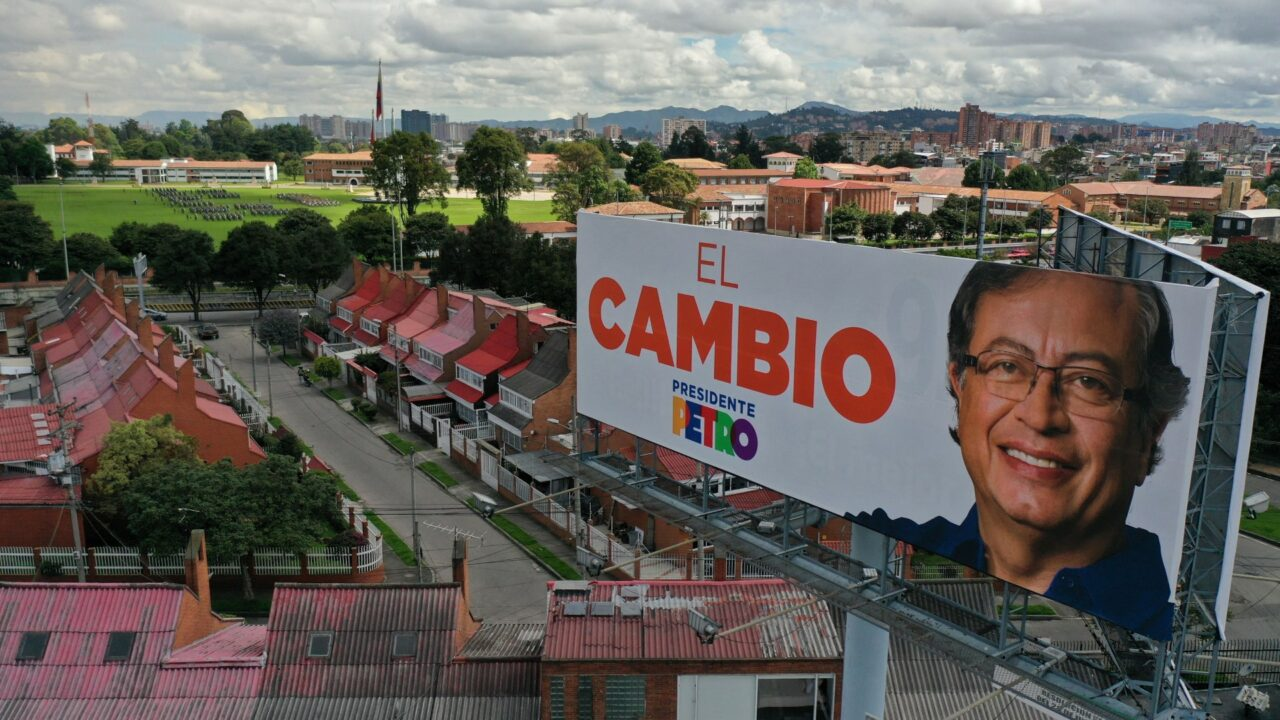President-elect Gustavo Petro is likely to temper his pre-election promises to change Colombia’s economic model in line with his left-wing views after he takes office on 7 August.
This assessment was issued to clients of Dragonfly’s Security Intelligence & Analysis Service (SIAS) on 8 July 2022.
There are already signs that he will take a pragmatic approach; Mr Petro has appointed a centrist-led cabinet, and a business-friendly treasury lead. Taking this into consideration, together with our analysis of his ideological objectives, we assess that some of the campaign proposals that were most troubling to many businesses will be watered down. That includes significantly increasing taxes and banning new oil exploration.
Mr Petro’s campaign manifesto included promises to upscale social spending, tax the rich and end economic dependence on fossil fuels. But it seems probable that once he has taken office on 7 August he will prioritise staying there, and investing in Colombia’s poorest. As president-elect, his rhetoric on taxation and the environment already appears to have softened, particularly towards businesses. Mr Petro has also met with conservative parties to agree on the policy priorities of the incoming government.
Reality check on Petro’s agenda
The president-elect’s recent moves appear to be mainly motivated by necessity. Mr Petro’s Historic Pact party only controls 25 of 188 seats in Congress, and 16 of 108 seats in the Senate. So he will need to rely on the votes from other parties to pass any laws. He has secured the support of the centre-right Liberal party and the centre-left Green Alliance, with 32 and 11 seats respectively, but even these would not be enough. He also needs firms to stay in Colombia to generate enough cash for his expensive social plan. But he seems to lack their confidence after the Colombian peso slumped 5% following his electoral win.
Even if Mr Petro were to change his mind and opt for a dogmatic approach to pursuing his ideological objectives in the coming years, there seems to be enough institutional counterweights to check his power. If he decided to bypass Congress and rule by decree, which looks unlikely based on our conversation with one of Petro’s advisors, the judiciary would very likely step in. An independent Central Bank would also, in our analysis, challenge any swift monetary policies. But even that seems unlikely given the moderate background of Mr Jose Antonio Ocampo, a former minister who is set to lead the Treasury.
Nevertheless, some of our clients are assessing how decisions by the new government will affect their operations in Colombia during the next four years. We have summarised what we assess are the most impactful reforms mentioned in Mr Petro’s electoral programme in the areas of social, trade, tax and energy. We have also provided an assessment of how able his government will be to implement these.
Near term policy priorities
Tax reform will almost certainly be Mr Petro’s top priority during his first 100 days, but not necessarily in the form which he promised on the campaign trail. Rising unemployment and a 13.3% increase in food prices since January will highly likely shorten his ‘honeymoon’ period; public pressure on his government to alleviate economic hardship is likely to build quickly. Given this, we are very confident that his cabinet will spend most efforts during its first months in office trying to reach a legislative quorum to pass a tax reform that enables it to fulfil campaign promises to low-income households.
Because this bill would need to reassure an already-anxious private sector and get the green light from Congress, we anticipate that the government will impose tax hikes on wealthy individuals rather than businesses. Together with protectionist rhetoric – rather than action – on the Colombia-US free trade agreement, these would be an easy boost for Mr Petro’s popular support base.
Longer term policy and risk implications
Beyond 2022, there are other political risks that we have identified could be of potential concern to clients and impact their operations in Colombia. The chart below shows what we assess is the most probable timeframe for these, along with the tax and trade reforms previously mentioned.

Mr Petro’s government can, but probably will not, stop issuing new oil licences. This is because doing so would highly likely generate a backlash from the private sector and therefore compromise his alliances in Congress. Not fulfilling this campaign promise is unlikely to cost him a significant amount of public support. Ideologically, this is an important matter for him given his academic background in environmental studies. But on balance, he is more likely to focus on long-term reforms for an energy transition such as improving environmental standards for oil contracts, rather than banning new exploration.
Another scenario that some clients have asked us about is whether Mr Petro will try to begin a process to rewrite the constitution during his mandate. This would be in an effort to fulfil his ambitious socialist agenda, as other left-wing leaders in the region have done in the past. There is a very low chance of this. That is not only because Mr Petro was involved in drafting the current constitution, but also that it would require support of a large majority of MPs, which he is highly unlikely to get in the next four years.
Another risk that has circulated in the Colombian media is a significant deterioration of civil-military relations during a Petro presidency. Press speculation about this stems from Mr Petro having formerly been a guerrilla fighter, and the army having tended to take a conservative stance. But we assess that the risk of a military coup is negligible. Unlike other Latin American countries, Colombia has no precedent of direct military intervention in politics, and we have not seen or heard any evidence of dissent within the security forces. On the contrary, the head of the army said publicly that it will obey Mr Petro’s orders.
The full version of this article is available to SIAS subscribers.
Image: view of a campaign banner of Colombian presidential-elect Gustavo Petro in Bogota on 14 June 2022; photo by Raul Arboleda/AFP via Getty Images







